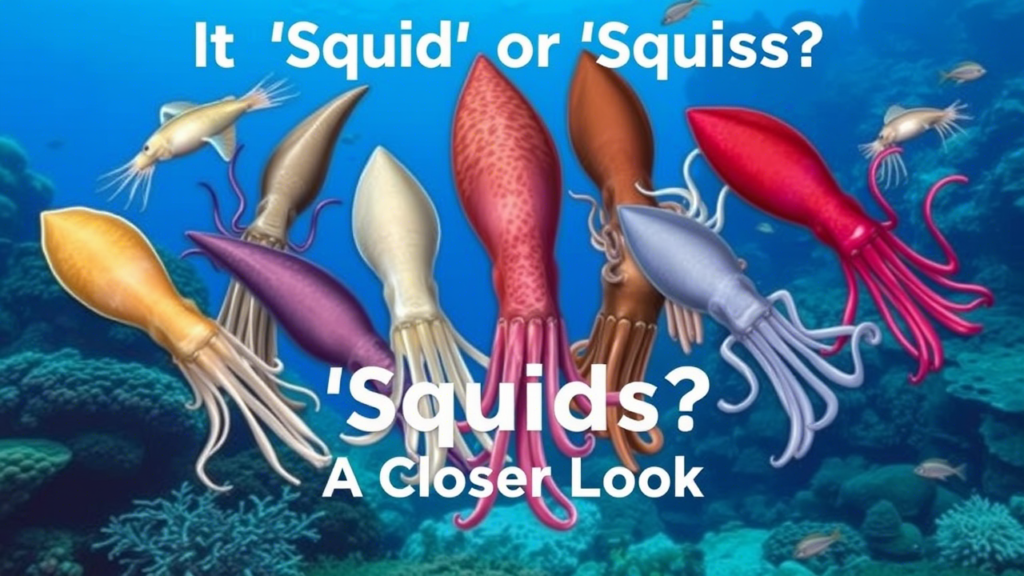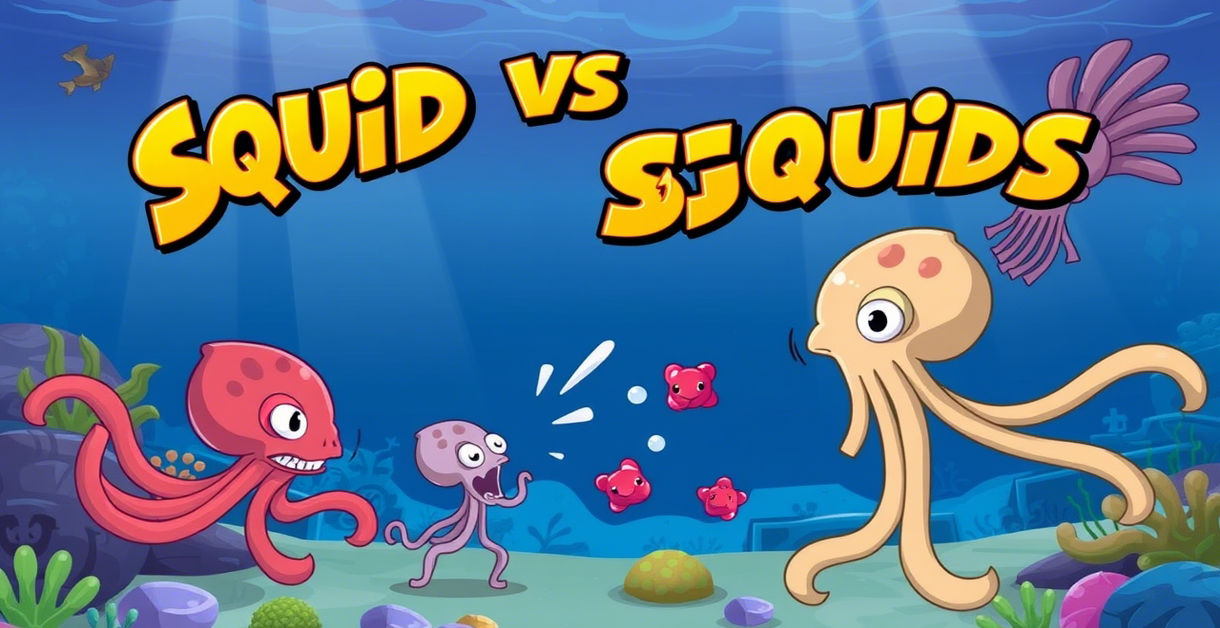When it comes to English grammar, few topics spark as much curiosity as the plural form of certain words. One such word that often leaves people scratching their heads is squid. Is it squid, or is it squids? The answer isn’t as straightforward as you might think.
In this article, we’ll dive deep into the world of marine biology, sea creatures, and English language rules to uncover the truth about the plural of squid.
The Basics: Singular and Plural Forms in English Grammar
Before we explore the specifics of squid, let’s take a moment to understand how plural nouns work in general. Most nouns in English follow simple rules: add an -s or -es to the end of the word. For example:
- Dog → Dogs
- Box → Boxes
However, there are exceptions—words like child (children) and mouse (mice) have irregular plural forms. This brings us to our main question: what is the plural for squid?
Is It ‘Squid’ or ‘Squids’? A Closer Look

In English, both squid and squids are considered correct, depending on context. Let’s break down when each form is used.
Using ‘Squid’ as Both Singular and Plural
In many cases, especially in scientific writing or discussions about marine life, squid remains unchanged whether you’re referring to one or multiple individuals. This usage aligns with other species names like deer or fish, which also stay the same in singular and plural forms.
For instance:
- “I saw three individual squid swimming near the reef.”
- “The study focused on the behavior of squid in the ocean food chain.”
This approach is common in academic writing and marine biology, where precision matters more than grammatical convention.
Using ‘Squids’ for Clarity
On the other hand, adding an -s to create squids can make your meaning clearer, particularly in casual conversation or storytelling. If you want to emphasize that you’re talking about multiple animals, using squids helps avoid confusion.
Example:
- “The divers spotted several squids darting through the water.”
Here, squids feels more natural because it explicitly conveys plurality.
Scenarios Where Each Form Works Best
To better understand how these forms function in real-world contexts, let’s look at some examples. We’ll include emails, social media posts, and even fictional dialogues to illustrate the differences.
Scenario 1: Email from a Marine Biologist
Subject: Observations on Squid Behavior
Dear Dr. Anderson,
During our recent expedition, we observed fascinating interactions among squid living in the coral reefs. These cephalopods demonstrated remarkable intelligence, using their tentacles to manipulate objects in their environment.
Interestingly, while discussing the findings with my team, I noticed some confusion regarding terminology. Should we refer to them as squid or squids? After consulting various sources, I concluded that sticking to squid maintains consistency with scientific conventions. However, if clarity is needed in public outreach materials, using squids could be beneficial.
Best regards,
Dr. Emily Carter
Scenario 2: Social Media Post by a Travel Blogger
“Day 5 in Australia 🌊✨ Just witnessed a pod of dolphins playing alongside a group of squids! Watching these incredible sea creatures glide through the waves was pure magic. #MarineLife #OceanAdventures”
In this case, squids adds a playful tone and emphasizes the presence of multiple animals.
Scenario 3: Fictional Dialogue Between Two Friends
Liam: Hey, did you hear about the new exhibit at the aquarium? They’ve got all kinds of cool stuff—sharks, rays, and even squid!
Mia: Wait, just one squid? That doesn’t sound very exciting.
Liam: No, no—it’s a whole tank full of them! But apparently, scientists call them squid regardless of how many there are. Weird, right?
Mia: Huh. Guess I’ll stick to saying squids. Sounds cuter anyway.
This exchange highlights the difference between technical jargon (squid) and everyday speech (squids).
Why Does Context Matter?
Understanding whether to use squid or squids depends largely on the situation. Here’s a breakdown:
| Context | Preferred Term | Reason |
|---|---|---|
| Scientific/Academic | Squid | Aligns with formal conventions |
| Casual Conversation | Squids | Enhances clarity and relatability |
| Storytelling/Descriptive | Squids | Creates vivid imagery |
| General Sense | Either | Depends on personal preference or audience |
As shown above, choosing the right term ensures your message resonates with its intended audience.
Cephalopods and Their Role in Marine Biology
To fully appreciate why squid holds a unique place in English, it’s worth exploring its role in marine biology. As members of the cephalopod family, squids are closely related to octopuses and cuttlefish. Known for their agility, intelligence, and ability to change color, they play a vital part in the ocean food chain.
Fun fact: Some squid species, like the giant squid, can grow up to 43 feet long! Imagine spotting not one but several of those during a deep-sea dive—you’d definitely need a good way to describe them!
Plural Nouns in English Language Rules

The debate over squid versus squids reflects broader trends in English grammar. While most nouns follow predictable patterns, others defy expectations due to historical influences or linguistic quirks. Consider these parallels:
- Fish → Fish (general sense) / Fishes (specific types)
- Sheep → Sheep
Like these examples, squid demonstrates flexibility based on usage. Whether you choose squid or squids, rest assured that neither option violates English language rules.
Tips for Choosing Between ‘Squid’ and ‘Squids’
Still unsure which form to pick? Here are some practical tips:
- Know Your Audience: Are you addressing scientists, students, or casual readers? Tailor your choice accordingly.
- Consider Tone: Formal settings lean toward squid, while informal ones favor squids.
- Prioritize Clarity: If ambiguity arises, opt for squids to eliminate doubt.
By keeping these factors in mind, you’ll master the art of selecting the perfect term every time.
Conclusion: Embracing Flexibility in Language
So, what is the plural of squid? The answer lies in understanding context and purpose. Whether you prefer squid for its elegance or squids for its simplicity, both options serve valuable roles in communication. By embracing this duality, we celebrate the richness and adaptability of the English language.
Next time someone asks, “What’s the deal with squid?” you’ll know exactly how to respond—with confidence, clarity, and maybe even a splash of humor.
Key Takeaways
- Both squid and squids are acceptable depending on context.
- Use squid in scientific or formal settings; reserve squids for casual conversations.
- Understanding plural nouns enhances your grasp of English grammar.
- Examples from marine biology highlight the importance of precise terminology.
Now go forth and impress your friends—or perhaps write an email to Dr. Anderson—with your newfound knowledge of the plural form of squid.

“Smith is the dedicated admin of [grammarprotips.com], a platform focused on enhancing grammar skills. With a passion for language and education, Smith strives to make grammar accessible and enjoyable for learners of all levels. Committed to delivering high-quality content, Smith continually explores innovative ways to help users master the complexities of grammar.”


This design is wicked! You definitely know how to keep a reader entertained.
Between your wit and your videos, I was almost moved to start my own blog (well, almost…HaHa!)
Wonderful job. I really enjoyed what you had to say, and more than that, how you presented it.
Too cool!
https://w1.datuangka.org/